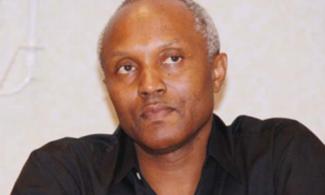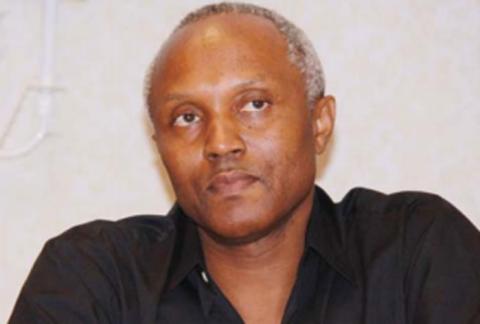
Okey Ndibe has gone down memory lane and penned a scintillating memoir, rendered in his trademark spellbinding prose that has endeared him to many readers of his fiction and essays. Never Look an American in the Eye: Flying Turtles, Colonial Ghosts, and the Making of a Nigerian-American is a must-read for all lovers of books, good stories, and beautiful prose.
On the eve of his relocation to the US, Ndibe relied on old tales and uninformed advice by an uncle who admonished him to “never look an American in the eye.” The writer’s belief in his uncle’s fantastic tales sometimes led to near-dire odds, including the tall task of convincing a suspicious police office that he was a person in perfect standing with the law, not the felon who robbed a local bank in Amherst, Massachusetts.
Born into modest circumstances, Ndibe took to flights of fancy to compensate for the lacks in his life. In the memoir, Ndibe offers us enthralling portraits of his childhood. In particular, he shows how, fueled by a plethora of fantastic tales told about the West by older relatives and strangers alike, most of them illiterates who never ventured outside their rural settings, he developed a callow fascination with the idea of traveling out of his native Nigeria to see the outside world that once had something of a fairytale quality.
Ndibe’s first choice was Britain, the country that had seized his homeland and given it the name Nigeria. Ndibe reminds us of a time when Britain alone was called “Obodo Oyibo,” the land of the white people. Then followed the writer’s enchantment with the Soviet Union, after he eavesdropped on talebearers who painted a romanticized image of Communism as a system where people own everything in common. Ndibe fell for the fantasy of a country where anybody could drive any car, sleep in any bed and eat any food they found, as a bearded village Marxist proclaimed. He recalls the words of the bearded purveyor of communist bliss: “It doesn’t matter who you are, once you feel the call of sleep, you can walk into any big house, look for the biggest room, lie down in the biggest bed—and sleep. Yes! The first to claim a big bed gets to sleep in it for the night. There’s no argument about it. If a ruler happens to walk in late, he may end up with the smallest bed. And he won’t make a fuss or demand that the person in the big bed get up for him. No!”
That vision so captivated the young, impressionable Ndibe that he began to dream of being in the Soviet Union and driving the best cars and sleeping in the most beautiful houses.
Just when the dream of a trip to the USSR was turning into a minor obsession, Ndibe was introduced to America through professional wrestling and American movies. He came to admire both the actors with fascinating names and wrestlers with massive physiques who often spoke in harsh, guttural voices.
As his interest in America grew, Ndibe continued to develop as a promising writer and journalist, his opinion pieces appearing in major Nigerian newspapers. He ended up landing a good job with a major newspaper where his first assignment was to interview Chinua Achebe, the famous novelist, and literary icon best known for his classic novel, Things Fall Apart. The interview birthed its own intriguing story, with the tape recorder malfunctioning, picking up not even a word the revered author had spoken. In one of the memoir’s early charged moments, the reader discovers about the malfunction after Ndibe has gathered his friends in a hotel room to listen to the great interview—only to realize the tape contains no sound. Ndibe marvelously recounts his panicked telephone call to the writer, and Achebe’s gracious acceptance to grant another interview, thereby possibly saving the young journalist’s job.
Ndibe has been fortunate to be encouraged and championed by several writers, among them Achebe and Wole Soyinka, winner of the 1986 Nobel Prize in literature. Using illustrative vignettes, Ndibe writes with great feeling about his relationships with these two writers as well as others. His narratives reveal his great respect and admiration for Achebe and Soyinka as well as the other writers—among them the African American John Edgar Wideman—who have played significant roles in his career.
The reader learns from the memoir that Ndibe relocated to the United States of America after Chinua Achebe invited him to be the founding editor of African Commentary, a well-respected journal published by Achebe. Ndibe’s first baptism of fire came at the interview for an American Visa when the joyless US consular officer stamped his passport with a rejection. Ndibe writes, “I have never been able to recall how I made it out of that hall of disenchantment. The memory of my exit has remained a blur. Perhaps I had hurried out, desperate to flee from the dream-aborting encounter. Perhaps I had tarried there, too stubborn or too wounded to move. Perhaps I had left slowly, one leisurely footstep placed in front of the other, in no haste lest the other visa dreamers smell my failure and their eyes peel away my despair layer after layer until the bleeding core of me was laid bare.”
He later received a favorable reconsideration, but he was in for more surprises. Ndibe captures his first experience and impression of America by observing that his dream destination gave him a chilly reception. He was later to discover that the “chilly reception” is an understatement for the cultural shocks he was to encounter in the US.
In this memoir as well as the two novels that preceded it, Okey Ndibe proves that he is a gifted writer who continues to use his talent to advocate relentlessly for social, economic and political changes both in his native Nigeria and his adopted home, America. The same sense of advocacy is noticeable in the memoir, where the author meticulously dissects some of his encounters in the US and generously offers what he felt was an antithesis to loud and obnoxious American sub-cultures.
Days after his arrival in the US, a young woman invited him to lunch. To his utmost surprise, after lunch, the lady demanded that he pay 50% of the tab, a shocking moment for the just arrived editor used to the Nigerian custom of having the person who extended an invitation picking up the tab. What followed that awkward episode is a script out of a hilarious, if amateur, comic movie. Ndibe is at his wittiest when he recollected the incident in the memoir, later declaring—on finding out that the phrase for what happened was “going Dutch—that he would rather continue to “go Nigerian.”
One of Ndibe’s most dramatically affecting encounters was when an Amherst police officer stopped him as a suspect in a bank robbery. Given that police stops, interrogation techniques and violence are currently a cause celebre in the US; it is a credit to Ndibe’s enormous talent that he not only could write about his terrifying experience with innate humor but also managed to elicit laughter from the reader as well. Accosted by the police and subjected to routine questioning, Ndibe—who was barely thirteen days in America—hacks back instinctually to the advice given by his aged uncle before he left for the US: “never look an American in the eye.” By avoiding eye contact with the officer, the author inadvertently heightens the officer’s suspicion even as the immigrant felt a glow of importance because the officer was addressing him as “sir,” a sharp contrast to what he was used to in Nigeria where police officers are wont to be more verbally brusque.
This memoir is a thrill to read, and yet offers powerful insights into the trials, prospects, and triumphs of being an immigrant in America. In a style that is impressively skillful, Ndibe masterfully conveys the odysseys of his early life in Nigeria and as well as his immigrant life in the US. I have never laughed harder in recent years when reading a book. Never Look an American in the Eye is a rich and layered memoir filled with exciting episodes that aptly illustrate the profound cultural shocks often experienced by new immigrants in the US (and, I suspect, anywhere else).
Get a copy and treat yourself to a blast of humor, beautiful prose and breathtaking encounters.
